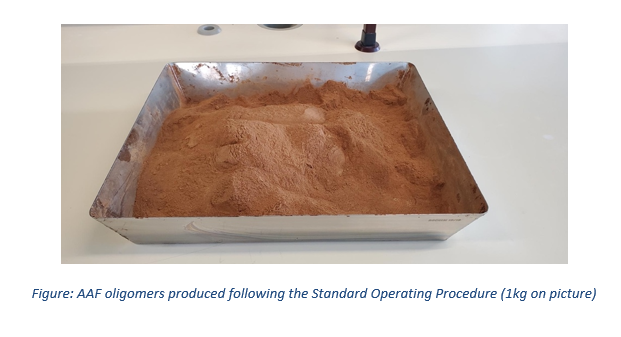March 2022
Result from partner BLOOM.
A project milestone has been achieved on 3 February 2022 in month 22 of the project (results documented in Deliverable 2.2 of Work Package 2 of the planned result: Extraction of lignin from biomaterials).
While technical lignins are cheap and available in large quantities, their characteristics are not suitable for the development of high-performance marine fuels. Notably, lignins suffer from low solubilities, large molecular weight, high sulphur content and are generally non-uniform in their chemical nature. One strategy consists in solvent fractionation of technical lignins to extract a high-quality fraction, which can be more suitable for fuels applications. A second strategy consists in the production of high-quality lignin from biomass with alternative biorefining process. Within IDEALFUEL, the partners selected solvolysis and Aldehyde-Assisted Fractionation (AAF) as the most relevant technologies to produce high-performance lignin for fuels applications.
After a previous scale up from lab scale to 15L scale, the AAF of biomass was tested at 250L and 630L scales, validating the production of >5kg of protected AAF lignin per week. Reaction conditions were optimised to maintain high yields while decreasing both the cost and the use of harmful chemicals. Safety studies, including thermal analysis and HAZOP, were successfully carried out.
- Objective: The production of suitable lignin is key for the formulation of a marine fuel. Within the scope of IDEALFUEL, the MS2 addresses the scale-up of the AAF biomass fractionation and optimisation of the oligomers’ production process by BLOOM.
- Research: BLOOM has defined a Standard Operating Procedure (SOP) from biomass extraction to oligomer isolation and optimised the process for oligomers production, with variations below 5% for oligomer’s OH content, molecular weight and solubility.
- Result: The outcome is a Proof-of-Concept production capacity of 1kg of AAF oligomers and a standardised protocol which can be used as a reference oligomers for future scale up. Over the course of the project, a total of 232kg of wood has been treated, yielding 24kg of protected AAF lignin.
- What will it be used for: Samples of the oligomeric fractions have been delivered to the IDEALFUEL consortium to test new catalysts and prepare the materials for fuel applications.
- Impact: Side streams of the AAF oligomer production are of kilograms of high-value molecules, extracted directly from Swiss beech wood and valorised through different market, including cosmetics and fragrances.
